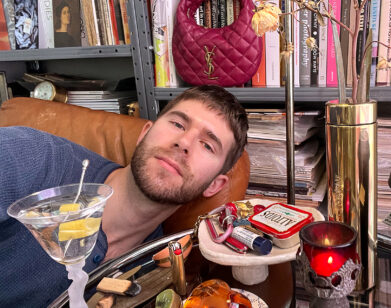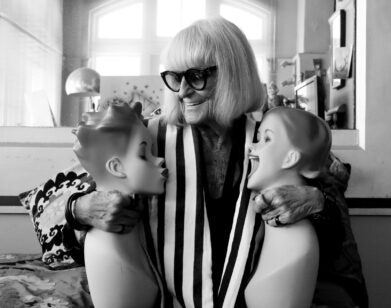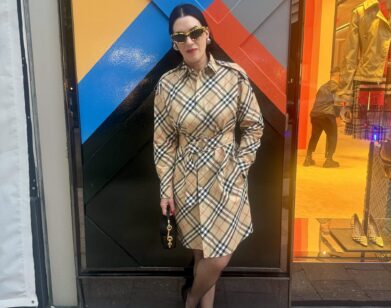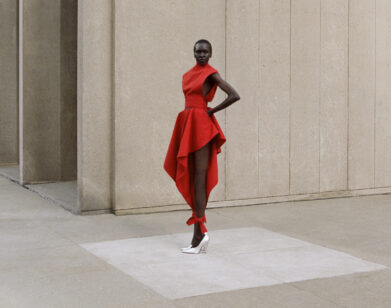Milan Vukmirovic
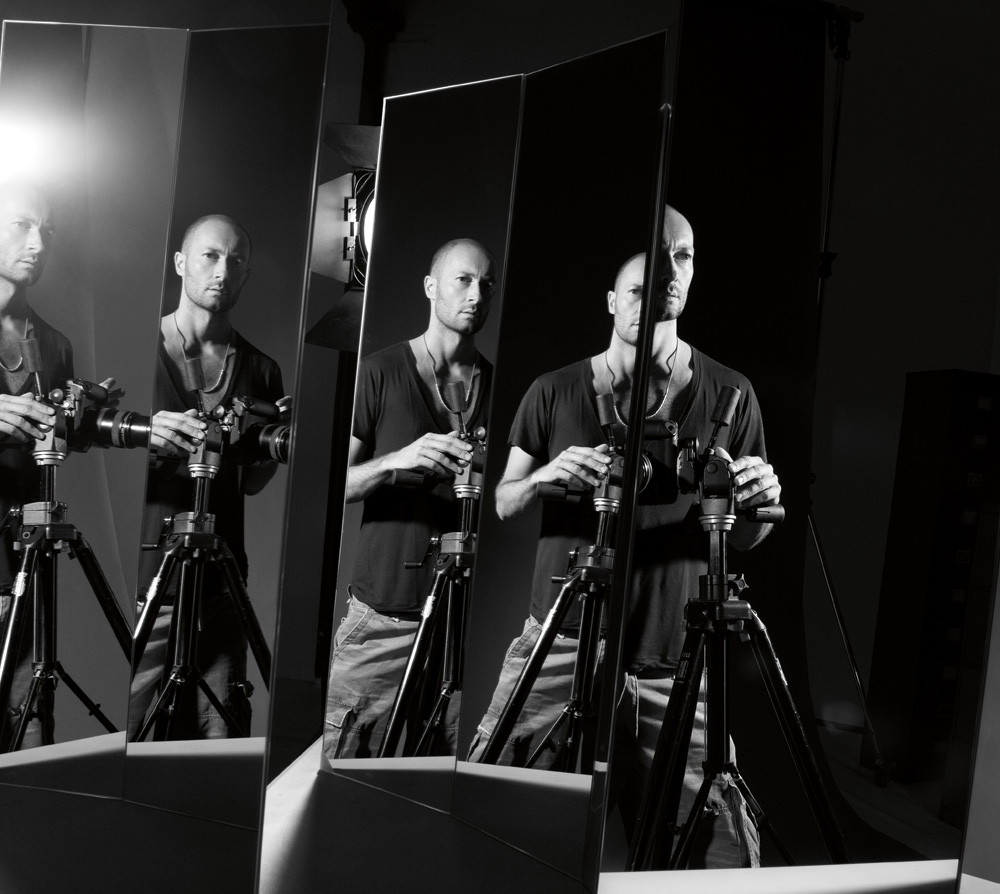
If Benjamin Franklin were alive today and had an interest in fashion and design, then he’d probably have a career very much like Milan Vukmirovic’s. The French designer has about a dozen other entries to add to his job description. First and foremost, Vukmirovic is the creative force behind the Italian luxury house Trussardi. Already in his second year with the leather brand, he’s brought his cool, refined aesthetic to menswear, luggage, and even a line of home furnishings. (His women’s collection for the label debuted this fall.) But, Vukmirovic is also a fashion photographer, who has shot campaigns for top brands like Armani, Hugo Boss, Lacoste, and Trussardi itself. He’s made use of his photo skills for his other career, as the editor of the quar¬terly magazine he launched in 2005, L’Officiel Hommes. And, in case anyone missed the man who once helped establish the Parisian store Colette as the premiere place to be caught shopping, Vukmirovic opened his own store, The Webster, (along with co-owners Laure Heriard Dubreuil and Frederic Dechnik) in Miami earlier this year. It’s not much of a surprise to learn that Vukmirovic designed the interior. What is surprising is that Vukmirovic found time to take a short vacation last summer, during which his friend, the artist Aaron Young, caught up with him to talk about how he manages to turn work into a 24-hour lifestyle.
AARON YOUNG: I know what you do, but I don’t know the extent of everything you do. Ido know that you’re superhard to get ahold of most of the time.
MILAN VUKMIROVIC: The thing is, when Iwork, Iwork. Like, recently Ihad to finish two magazine issues at once. Ido L’Officiel Hommes, and Ijust launched an Italian edition. So before my vacation Ihad to finish both—along with selling a women’s collection that we’re presenting this fall and finishing the interior of a restaurant and store that we’re doing in Milan. I’m working until six or seven o’clock in the morning because Ilove it. It’s fashion. And I’m like you, Aaron. I’m a night person. Ido 20 hours of work each day. I’ve done so much lately, I’ve even felt a little bit sick physi¬cally. But when you love what you do, it’s fine.
YOUNG: When you’re in the moment of passion doing what you’re doing, it’s never work. It’s just your life. The work contains your life, you know?
VUKMIROVIC: That’s why Ithink we’re both very lucky because even if what we do is hard, we’re doing something we like—we wake up and we’re doing it. And maybe we never want to go to sleep because we love what we’re doing. That can be dangerous, though. On top of being on vacation right now, I’m trying to quit smoking. Smoking helps me work, but Iwant to try to be a little healthier. A few weeks ago, Iwent to photograph Pete Doherty at his country house in England. He was smoking cigarette after cigarette and drank a lot. He doesn’t have a very healthy life. His house is great, and Ithink he’s a genius musician. But it made me think that when you’re in a creative field like fashion or art or music, you want to give emotions to people, and the process can be very destructive. It’s difficult to find the right balance.
YOUNG: That’s the thing. When you’re thinking of creating, and that includes all of these other habits, it’s kind of like apple pie and ice cream—everything just starts to meld together. Drinking, smoking, every¬thing . . . they all gel with what you’re doing. When it becomes a habit, it becomes part of your process. That’s why it’s so difficult when you have so many projects going on to suddenly say, “Okay, I’m going to quit smoking.”
VUKMIROVIC: Exactly. [laughs] Iremember something you told me the day that we opened the Webster in Miami. It really touched me. You said, “Sometimes businesspeople don’t understand that we are very sensible people. When we work, we work all the time because everything we do is part of our creative process. It doesn’t matter if it’s an idea or an entire project. You can’t even quan¬tify the work in terms of days or hours—it’s all the time.” When you said that, Ithought, Finally someone understands. Being creative means every¬thing you see, everybody you talk to, every movie, every magazine, every person in the street, every window of a store—you look at everything all the time because you’re astonished. And that’s the dif¬ficulty with businesspeople—especially with what’s happened with the economy this year—you really can’t quantify the work you do in terms of hours.
YOUNG: Well, I’m definitely impressed with all of the hats you manage to wear at once. It’s kind of like this crisscrossing hopscotch, always jumping around. But the whole time you’re advancing one vision. It’s much the same as an art practice. Every individual art piece advances one focused vision.
VUKMIROVIC: Ithink we are part of a new gen¬eration of people who accept that, too. You as an artist do a lot of things, you touch a lot of things—you don’t just do painting, you also do video and performance and sculpture. Ithink we’re part of a generation that isn’t so corralled. Maybe it’s due to the Internet. Whatever it is, I’m glad, because at the beginning a lot of people weren’t all that nice or easy on me. They would say, “Are you trying to do this, or are you trying to do everything?” But I’m very happy we’ve reached a stage where there aren’t these lim¬its. You don’t have to say, I’m just a painter, designer, musician, or filmmaker. Now it’s all mixed. In the end, it’s about vision and choosing the right things to fulfill that vision. Photography is my biggest passion today. That’s what Ilove. Icould stop everything else just to do that—but Iwon’t because Ilove every-thing that Ido. It keeps my mind fresh all the time, because otherwise you get stuck. People always want to put you in a box: This is what he does. This is how he dresses. This is his style. Ithink that’s old-fash¬ioned. Everything is getting faster. Our generation gets bored. We always want something new, to be excited, to travel. Ifeel like I’m part of that gener¬ation. Istarted in fashion 20 years ago, when Iwas really young. But 20 years ago it was impossible to have that kind of freedom.
YOUNG: There is an amazing speed of access right now. Everyone wants something new immediately. Sometimes it’s all, “What have you done for me lately?” and you think, “Hey, Ijust did a show three months ago. Let it resonate.” But there’s a lot of tension with that. Artists can tighten up under the pressure to always make, always please, always cre¬ate something new, always have to stay on the top—or really on some type of edge. Ialmost think that it’s part of the job of the artist right now to release all of that tension. Because there’s too much shit out there, there’s too much crap that gets too much attention already. So when we are putting something out there into the world, we have to back it up. And really say, “Okay, this belongs out here.”
VUKMIROVIC: Everyone knows everything about a product right away, they know the marketing and they know how it works. So Ithink at the moment, the important thing is for something to have a soul—a real emotion. If you make something personal, that’s what makes the difference. You have to make people feel things. That’s what Ido in my work, and Ithink that’s what you do in yours. And am Iright or am Iwrong?
YOUNG: No, you’re completely right.
VUKMIROVIC: Ithink your work has evolved. Ithink what you do is about energy, about strength, about what you have in your stomach. And that’s what Ilike because that’s what makes things successful. It’s a personal point of view. Even in magazines, the success of the product is based on the personality of the person in charge. Idon’t believe in something that is done just for numbers or by businesspeople. It doesn’t work like that. Fashion doesn’t work like that. It’s like a recipe for cooking. It has to be something that comes from the soul. And sometimes I’m afraid that can be destructive because it’s difficult to be naked in front of people and say, “This is who Iam. This is what Ido. This is what Ibelieve, and Iwant you to like what Ido.” It’s difficult. It makes you fragile.
YOUNG: Ithink this is the most difficult part of our job. Once you present something, then you’re just stripped down to, Okay, are they going to understand that I’m baring my soul? Ithink a lot of the time the numbers and the advertising and all of that gets talked about more than the artists putting themselves out there completely stripped down.
VUKMIROVIC: You’re a very strong guy. When Ilook at you, you are strong. But Iknow you are also a very, very sensitive person. Because you’re an artist. But Idon’t suppose you’d want to live any other way than as an artist?
YOUNG: No way! Nothing great ever comes easy. There is suffering. And I’m not saying that to feel sorry for myself, because we do put ourselves in that position. But Ithink the most amazing work comes out of putting yourself on that edge.
VUKMIROVIC: Yeah, Itotally agree. In the end, Ithink that the people around you are very impor¬tant. Because they can love you and control you and help you not to think that we are always very alone in all this work. So maybe you caught me in a very positive moment because I’m on vacation. [laughs]
Photos: Inspiration board by Milan Vukmirovic. Self-portrait, August 2009.
Aaron Young is a New York, Paris, and Miami Beach-based artist.


